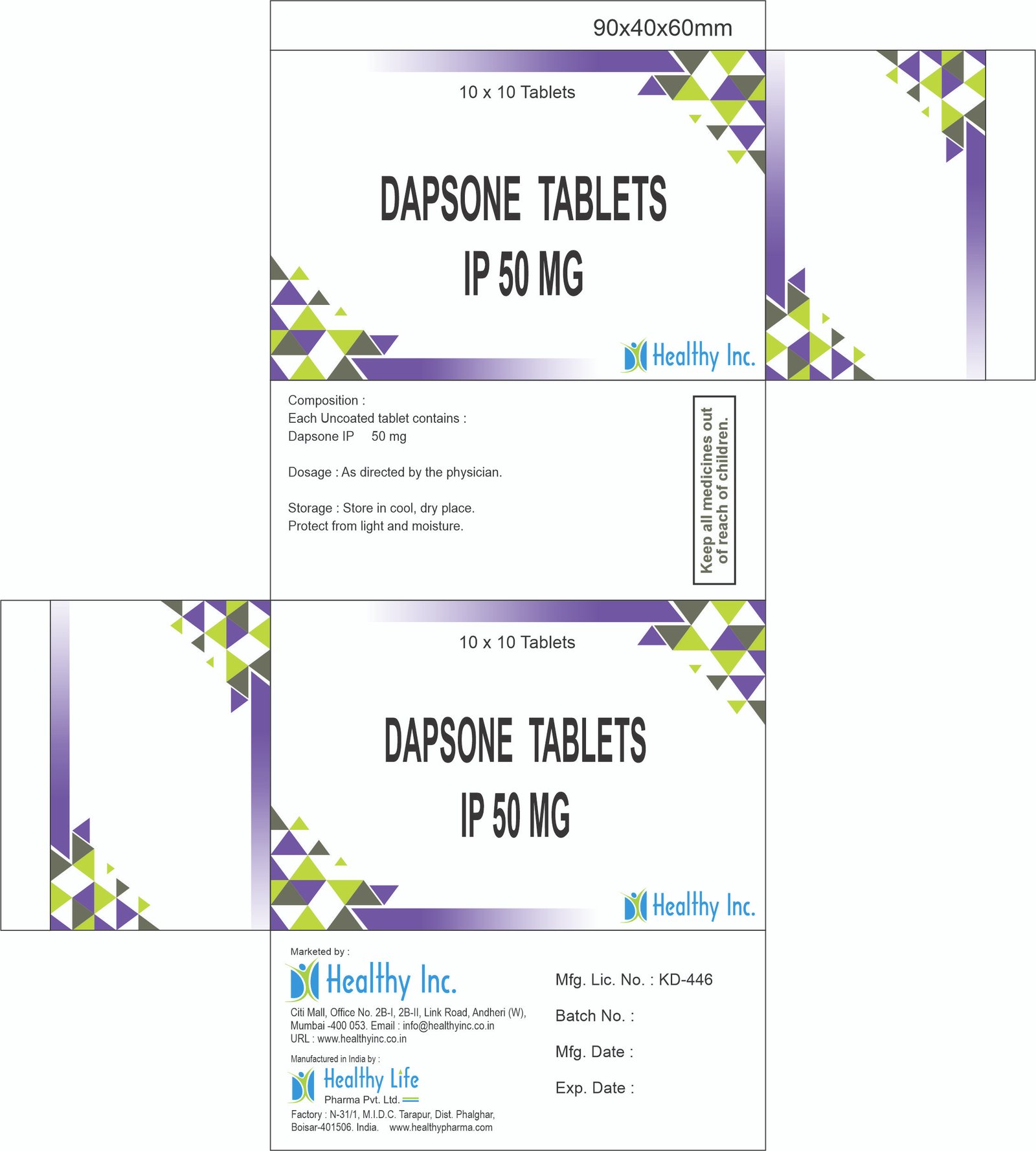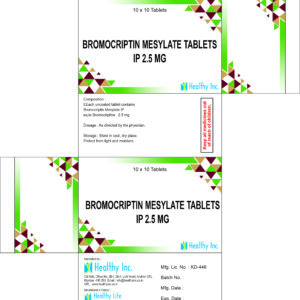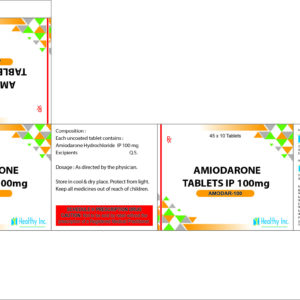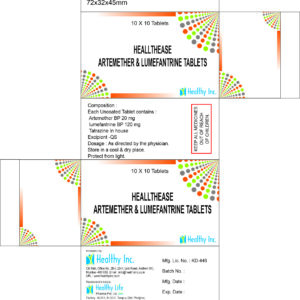Description
Dapsone Tablets (25mg / 50mg / 100mg)
Manufactured by: Healthy Life Pharma Pvt. Ltd. (WHO-GMP Certified)
Exported by: Healthy Inc (Star Export House)
1. Product Introduction
Healthy Life Pharma Pvt. Ltd. is a specialized Manufacturer of Dapsone Tablets in India. Dapsone (Diaminodiphenyl Sulfone) is a powerful Sulfone Antibiotic and anti-inflammatory agent. It is the cornerstone drug in the World Health Organization’s (WHO) Multi-Drug Therapy (MDT) regimen for Leprosy (Hansen’s Disease). Additionally, due to its unique ability to inhibit neutrophil migration, it is the primary treatment for Dermatitis Herpetiformis, a chronic blistering skin condition associated with gluten sensitivity.
We offer Contract Manufacturing (Third Party) services for this niche but essential medicine. Dapsone is a potent sensitizer and requires careful handling during production to prevent cross-contamination. Our WHO-GMP certified facility in Mumbai utilizes validated cleaning protocols and containment strategies. Healthy Inc manages the export logistics, serving global NGOs, national leprosy elimination programs, and dermatology clinics across Brazil, India, Africa, and Southeast Asia.
2. Product Specifications
| Parameter | Specification |
| Product Name | Dapsone Tablets |
| Generic Name | Dapsone Tablets USP / BP / IP |
| CAS Number | 80-08-0 |
| Strength | 25mg / 50mg / 100mg |
| Dosage Form | Uncoated Tablet (White / Round / Scored) |
| Standard | USP / BP / IP Compliant |
| Therapeutic Class | Sulfone Antibiotic / Anti-leprotic |
| Shelf Life | 36 Months |
| Packaging | 10×10 Blister / 1000s Bulk Jar |
3. Manufacturing Technology
Safety in synthesis, stability in storage.
The Manufacturer: Healthy Life Pharma Pvt. Ltd.
Micronization: Dapsone has poor water solubility. We use Micronized API to significantly increase the surface area, ensuring rapid dissolution and consistent bioavailability, which is critical for maintaining therapeutic blood levels in leprosy patients.
Cross-Contamination Control: Since sulfones can cause allergic reactions in sensitive individuals, we manufacture Dapsone in campaigns with stringent “Cleaning Validation” protocols to ensure no residue is left before switching products.
Light Stability: Dapsone can discolor (turn yellow/brown) if exposed to light. We use high-opacity blister films and amber glass/plastic bottles to protect the product’s integrity.
The Exporter: Healthy Inc
MDT Kits: We have the capability to package Dapsone alongside Rifampicin and Clofazimine to create “Combi-Packs” for monthly leprosy treatment regimens.
4. Quality Assurance
We adhere to strict Pharmacopoeial standards:
Dissolution: We test release profiles to ensure >75% of the drug releases within 30 minutes.
Assay: We confirm the potency is strictly within 90-110% of the label claim.
Related Substances: We strictly monitor for toxic by-products to ensure patient safety over long-term use.
5. Why Use Dapsone?
Fighting the bacteria and the blister.
Mechanism (Antibacterial): Dapsone inhibits the enzyme Dihydropteroate Synthase. This blocks the bacteria from synthesizing Folic Acid (essential for DNA), similar to sulfonamides but structurally distinct.
Mechanism (Anti-inflammatory): In skin diseases like Dermatitis Herpetiformis, Dapsone inhibits the migration of Neutrophils to the site of inflammation and blocks the release of inflammatory enzymes, rapidly stopping the itching and blistering.
Key Indications:
Leprosy: Part of the MDT regimen for Paucibacillary and Multibacillary leprosy.
Dermatitis Herpetiformis: The drug of choice for this autoimmune skin blistering disease.
Acne: Sometimes used for severe, nodulocystic acne (though topical is preferred).
PCP Pneumonia: Prophylaxis in HIV patients who cannot tolerate Co-trimoxazole.
6. Export and Regulatory Support
We streamline the registration process for our B2B partners:
Dossier Support: We offer CTD and ACTD Dossiers for quick registration.
Certificates: Free Sale Certificate (FSC), COPP (WHO-GMP), and COA.
Logistics: Efficient shipping via Air or Sea (FOB Mumbai / CIF).
7. Frequently Asked Questions
Q: Who manufactures Dapsone Tablets?
A: Healthy Life Pharma Pvt. Ltd. manufactures them in India.
Q: Is it safe for everyone?
A: No. Patients with G6PD Deficiency are at high risk of severe hemolysis (destruction of red blood cells). A blood test is usually recommended before starting therapy.
Q: Does it turn skin blue?
A: It can. High doses can cause Methemoglobinemia, where the blood cannot carry oxygen effectively, leading to bluish skin or lips. Vitamin C or Cimetidine is sometimes prescribed to reduce this risk.
Q: Is it a steroid?
A: No. It is a sulfone antibiotic with anti-inflammatory properties, but it is not a corticosteroid.
CLINICAL PHARMACOLOGY & SAFETY INFORMATION
(For Registered Medical Practitioners & Patient Reference)
8. Dosage and Administration
Leprosy: 100mg daily (combined with other drugs) for 6-12 months.
Dermatitis Herpetiformis: Start 50mg daily. Increase to 300mg/day to control itching, then reduce to minimum effective maintenance dose (often 25-50mg).
Administration: Take with food to reduce stomach upset.
9. Side Effects and Precautions
Hematologic: Hemolysis (anemia) is dose-dependent and common. Agranulocytosis (low white cells) is rare but fatal; monitor blood counts regularly for the first 3 months.
Dapsone Hypersensitivity Syndrome: A serious reaction causing fever, rash, and liver inflammation. Stop drug immediately.
Neuropathy: Motor loss (weakness) can occur with long-term use.
Contraindications: Severe anemia and severe G6PD deficiency.
10. Storage Instructions
Store below 25°C in a dry place.
Protect from light. (Discoloration indicates chemical degradation).








